CHÉOS’ Work in Progress (WiP) Seminars highlight the cutting-edge research that our Scientists are working on to inform and improve health care from the individual to the system level. In early 2023, Dr. Skye Barbic challenged attendees to rethink measurement practices in health services research; Dr. Daniel Vigo provided an overview of mental health and substance use in Canada; and Dr. Farinaz Havaei described the Synergy Tool and its impact on long-term care. These summaries are modified from our live tweet threads covering the presentations. Follow us @Advancing HealthNews!
Purposeful, accountable, and patient-informed: Rethinking measurement practices in health services research
With CHÉOS Scientist Dr. Skye Barbic
Our first WiP of 2023 started with a strong general focus topic with Foundry Head Scientist Dr. Skye Barbic discussing measurement. She highlighted the importance of measurement, saying, “Measurement is about collecting numbers that mean something.” In health research, it’s important to consider measurement from the view of the patient.
“Who are we measuring? What are their perspectives on the outcomes which are being measured?” Dr. Barbic emphasized the importance of considering the tools being used to gather accurate measurements. The right tool is critical to ensure that research is useful to those who are most affected: the patient. In health care, what measurements matter to patients? Is the right tool being used?

Looking for some guidance? The FDA published a roadmap to patient-focused outcome measurement. It’s important to use tools and collect measurements that make a difference to the people being measured.
“It cannot be boring!”
This was one of the key messages from Dr. Barbic’s youth research partners for a recent publication in the Journal of Patient-Reported Outcomes and a real-world example of the importance of patient-focused measurement. This open-access article shares how Dr. Barbic and her research team developed a measure of function for young adults accessing youth services by communicating directly with youth. Among other important findings, the work suggests that survey items cannot be boring or youth won’t buy into the process of filling in measures.
Mental health and substance use in Canada: Burden, services, and policy
With CHÉOS Scientist Dr. Daniel Vigo
Scientific Advisor to the Pan-American Health Organization (PAHO) and World Health Organization (WHO) Dr. Daniel Vigo shared the disease burden concept which incorporates years lived with disability and years of life lost. In Canada, the mental health-related disease burden changes over a person’s lifetime. For example, drug use disorder is a significant proportion of the mental health disease burden in younger populations. How can we understand this challenge to determine a good approach?

The following graph, provided by the BC Coroners Service, shows illicit drug toxicity deaths, including a dip in mortality in 2019. What could have caused the dip? One possibility mentioned was China’s crackdown on fentanyl exports. This information is cited from an article published by CHÉOS Scientist Dr. R. Michael Krausz discussing shifting North American drug markets. Dr. Vigo also pointed to the wide distribution and accessibility of naloxone kits as a potential driver of the 2019 dip.

What can be done or has been done to prevent and treat substance use disorders locally? Dr. Vigo shares a variety of tools, including community mental health teams, safe consumption sites, and opioid agonist therapy, which can be used. These tools are placed along a vertical axis of economic cost and a horizontal axis of political risk. Tools in blue font have some level of evidence backing their effectiveness.

When looking at controlling substances, there appears to be a “sweet spot” which balances the impact on health with public health regulation. Remember the 80s? Cigarettes are a real-world example where their usage was unregulated and not only negatively impacted the health of smokers, but also non-smokers until regulations were implemented. On the other hand, the prohibition of substances like opioids and, historically, alcohol has had negative health impacts.
example where their usage was unregulated and not only negatively impacted the health of smokers, but also non-smokers until regulations were implemented. On the other hand, the prohibition of substances like opioids and, historically, alcohol has had negative health impacts.
If you are interested in learning more about the global disease burden of mental health, read his published article in The Lancet Psychiatry.
An introduction to Synergy Tool implementation and the impact on long-term care
With CHÉOS Scientist Dr. Farinaz Havaei
 While long-term care (LTC) delivery has been persistently and negatively impacted by ongoing workforce challenges, resident-centered models of care provide an opportunity to enhance LTC provision and improve resident and provider well-being. CHÉOS Scientist Dr. Farinaz Havaei discussed how LTC delivery was significantly compromised due to heavy workloads prior to COVID-19. Policy & practices implemented during COVID-19 exacerbated existing challenges, compromising resident care and caretaker mental health.
While long-term care (LTC) delivery has been persistently and negatively impacted by ongoing workforce challenges, resident-centered models of care provide an opportunity to enhance LTC provision and improve resident and provider well-being. CHÉOS Scientist Dr. Farinaz Havaei discussed how LTC delivery was significantly compromised due to heavy workloads prior to COVID-19. Policy & practices implemented during COVID-19 exacerbated existing challenges, compromising resident care and caretaker mental health.
To help tackle some of these challenges, Dr. Havaei and her team used the Synergy Tool which looks at a ‘fit’ between patient characteristics and nurse competencies. It evaluates eight characteristics including complexity, stability, vulnerability, predictability, resiliency, and participation in care & decision-making.
looks at a ‘fit’ between patient characteristics and nurse competencies. It evaluates eight characteristics including complexity, stability, vulnerability, predictability, resiliency, and participation in care & decision-making.
The Synergy Tool is being used to optimize care at various sites throughout Canada including with the BC Nurse Workload Project where it will be implemented at 8 practice sites and in acute care settings in Saskatchewan and Ontario.
Learn more about Dr. Havaei’s project and how the Synergy Tool is being used in long-term care in our article here.
Want to learn more? Watch Dr. Farinaz Havaei’s WiP here!
Note: Images have been screen-captured from the WiP presentations and may be slightly modified for this article. Previously published figures have been referenced in the image caption.



